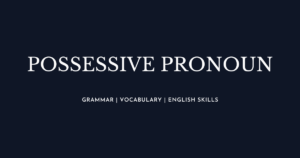What are Indefinite Adjectives?
Indefinite Adjective is used to describe a noun in a non-specific way. In other words, it modifies nouns to give information about it that are not specific (uncertain). It is one of the types of Adjectives in English Grammar.
Some of the examples of Indefinite Adjectives are few, many, each, plenty, more, much, etc.
Indefinite Adjectives also modifies Pronouns and function the same as the nouns. It is usually classified as Quantifiers which is a type of determiner in English grammar.
Below are more examples list of Indefinite Adjectives.
| Indefinite Adjective | Indefinite Adjective |
| few | some |
| many | several |
| each | any |
| plenty | anyone |
| more | everybody |
| much | something |
| all | someone |
| none | anything |
Also Read: What is Adjective with examples? | Best English Guide 2025
The adjective is a type of word which describes or modifies the noun. It is also defined as, the word which describes the qualities and states of beings of nouns. It measures the qualities like size, shape, colour, duration, behaviour, quantity, etc… (Read More)
Examples of Indefinite Adjectives
- Only a few students have performed well in the exam.
Sentence Structure: Only a + few (IA) + students (subject) + have performed (verb) + well in the exam (object).
The adjective (few) is used to measure the number of people who wrote the exam well (which is not accurate). Here, the Subject (students) is a noun.
- Many of them started using Social Media to connect with their friends and families.
Sentence Structure: Many (IA) + of them (subject) + started using (verb) + Social Media to connect with their friends and families (object).
The adjective (many) is used to measure the number of people who started using social media (which is not accurate). Here, the Subject (them) is a pronoun.
- Each participant got an award in the competition.
Sentence Structure: Each (IA) + participant (subject) + got (verb) + an award in the competition (object).
The adjective (each) is used to indicate the number of participants who got an award. The information is still inaccurate because the number of participants is still unknown. Here, the Subject (participant) is a noun.
- We should drink plenty of water every day for good health.
Sentence Structure: We (subject) + should drink (verb) + plenty (IA) + of water every day for good health (object).
The adjective (plenty) is used to measure the quantity of water (which is not accurate). Here, the Subject (we) is a noun.
- I received more presents on my birthday this year.
Sentence Structure: I (subject) received (verb) + more (IA) + presents on my birthday this year (object).
The adjective (more) is used to measure the number of presents (which is not accurate). Here, the Subject (students) is a pronoun.
- The movie is not much entertaining.
Sentence Structure: The movie (subject) + is (verb) + not + much (IA) + entertaining (object).
The adjective (much) is used to describe the level/intensity of the emotion. Here, the Subject (movie) is a noun.
- The teacher told all the students to submit the homework tomorrow.
Sentence Structure: The teacher (subject) + told (verb) + all (IA) + the students to submit the homework tomorrow (object).
The adjective (all) is used to describe the number of students who have to submit their homework. Here, the Subject (teacher) is a noun.
- None of my friends is from Italy.
Sentence Structure: None (IA) + of my + friends (subject) + is (verb) + from Italy (object).
The adjective (none) is used to indicate the number of friends who are not from Italy. Here, the Subject (friends) is a noun.
- Some people are very kind here.
Sentence Structure: Some (IA) + people (subject)+ are (verb)+ very kind here (object).
The adjective (some) is used to describe the number of people who are kind (not accurate). Here, the Subject (people) is a noun.
- The question paper got leaked in several institutions.
Sentence Structure: The question paper (subject) + got leaked (verb) + in + several (IA) + institutions (object).
The adjective (several) is used to describe the number of Institutions in which the question paper got leaked (not accurate). Here, the Subject (question paper) is a noun.
- The teacher told that this time any student can become a class monitor.
Sentence Structure: The teacher (subject) + told (verb) + that + any (IA) + student can become a class monitor this time.
The adjective (anyone) is used to describe that any student can become a class monitor. Here, the Subject (teacher) is a noun.
Some tips while using Indefinite Adjectives
1) Tip 1: Write “all the” instead of “all of the” to improve the accuracy and latency of the sentence.
Example Sentences:
- General Sentence: All of the collegues went for a trip this weekend.
- Recommended: All the collegues went for a trip this weekend.
- General Sentence: All of the songs became popular these days.
- Recommended: All the songs became popular these days.
2) Tip 2: Use the word “fewer” with plural nouns and “less” with singular nouns.
Example Sentence:
- Singular: The actor only appeared less number of times in the film.
- Plural: The actor only got fewer roles in his recent filims.
3) Tip 3: Use “their” instead of “his/her”in the sentence.
Sentence: Each person has his own opinion on politics.
Here, the sentence can be misleading because the person also can be female. So, you can avoid this by using either of the two options which are mentioned below.
- Option 1: Each person has their own opinions on politics.
In the above sentence, using “their” is acceptable to use in the sentence (for both male and female).
- Option 2: Each person has his/her own opinions on politics.
This sentence is also acceptable but it is not that much preferred because it is a little bit clumsy.
Summary: (What are Indefinite Adjectives?)

Here is the summary of what we had learnt in this post (guide).
- Idefinite Adjective is a type of adjective used to describe the information about the noun which is not accurate.
- Some of the examples are any, each, all, some, every, etc.
- This adjective also modies the pronoun in the sentence.
- Indefinite Adjectives are recommended to use if the information is not accurate to describe (it should not be measurable).
- We can improve the latency and accuracy by excluding “of” in “all of the”.
If you are interested to learn more, then you can refer to Wikipedia here.
I hope that you understood the topic. If you still have any doubts, then comment down below and we will respond as soon as possible.
Liked this article? Please do share this with others. Thank you 🙂






